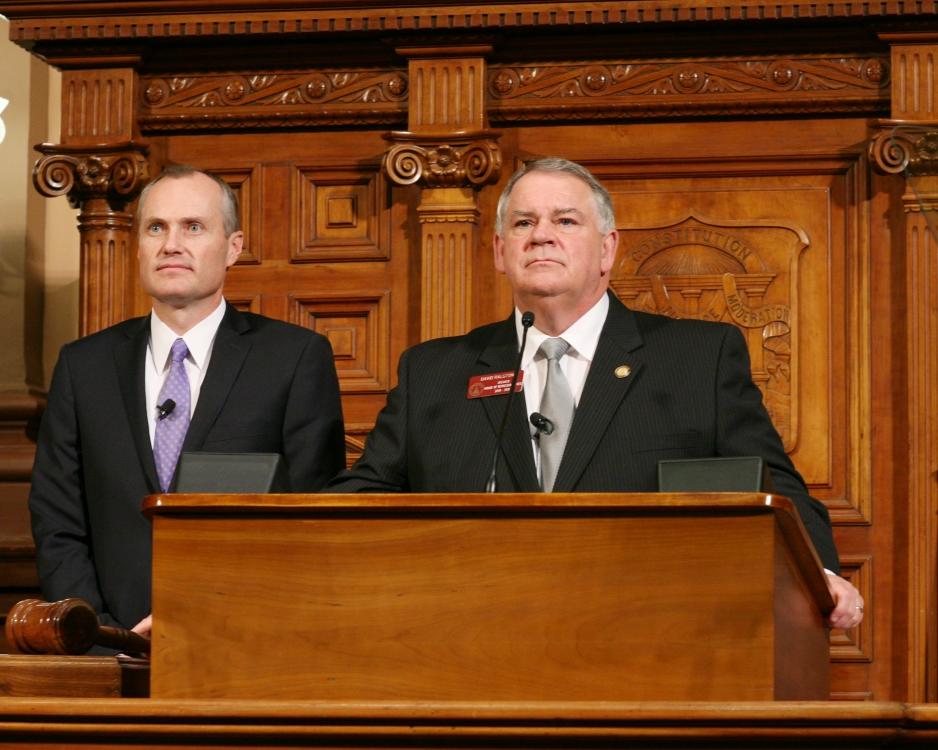
Section Branding
Header Content
State Tax Plan Won't Boost Revenue
Primary Content

State lawmakers spent the week squabbling over whether a proposed tax plan would give every Georgian a tax break. Democrats have argued with Republicans, and House leaders have argued with those in the Senate.
And no one has paid much attention to whether the tax plan would increase state revenues.
Republican leaders have proposed reducing the state income tax from 6 percent to 4.5 percent. They also want to eliminate some deductions while adding some taxes on services. GOP leaders will spend the next week ensuring those changes won't also raise anyone’s taxes.
But Alan Essig with the nonprofit Georgia Budget and Policy Institute says lawmakers should be gearing the changes to boost tax collections.
“When they first formed the tax reform council, one of the issues was how to deal with the immediate fiscal crisis and the structural deficit going forward," he said. "This doesn’t help with that. And that’s very problematic. This isn’t going to help the budget. This isn’t going to help avoid future cuts to education, healthcare, infrastructure.”
Republicans announced last year that they wanted to rewrite the state’s tax code, and they formed a special tax council. But they've rejected most of the council's proposals. Most notably, they scrapped a proposed grocery sales tax.
Republican leaders say the point of rewriting the tax code is to make Georgia competitive with surrounding states, including two that don't have any income tax. And they've made it clear they want the tax plan to be "revenue-neutral."
House majority leader, Republican Larry O’Neal, says reducing the income tax rate would make it clear that Georgia "is open for business."
“We’re trying to make it so that no one has to pay more taxes," O'Neal said on a break this week from a floor debate. "We want most people to pay less. But we’re sending a message nationally and internationally that our tax rate is 4.5 percent. The psychological advantage of that is tremendous in the economic development arena.”
The plan the Republicans proposed would not only reduce the state income tax, but it also would eliminate some deductions for charitable donations, and add taxes on auto repair and telecommunication services.
Early this week, Democrats charged that the plan would cut taxes for people with lower incomes, and the wealthy, but not the people in between. House minority leader, Rep. Stacey Abrams, brought this to the attention of Republican lawmakers at a committee meeting Tuesday afternoon. The committee, nonetheless, approved the plan and expected a House vote on Wednesday.
But after a day of poring over the numbers, Senate Republicans were forced to agree with Abrams late Wednesday evening.
“As Rep. Abrams pointed out, there was a gap of people in there that were going to have tax increases," said Senate President Pro Tempore Tommie Williams of Lyons, a Republican. "And we’re not about putting tax increases on middle incomes so we’re making some changes so that that bracket of people would not be incurring tax increases.”
In addition to disagreements over details in the tax plan, House leaders have indicated that a leadership crisis in the Senate has played a role in the holdup.
Late Thursday, Speaker of the House, David Ralston, a Republican, said it would be helpful if Senate Republicans clarified their leadership structure. He said "their little experiment" was preventing legislators from moving forward with the tax reform plan. Ralston said the plethora of leaders in the Senate is hampering negotiations, and could hurt the people of Georgia.
“We can’t have 36 different leaders or however many they have on particular day," Ralston said after the House adjourned. "I think the people of Georgia voted in November in the race for Lieutenant Governor. I think when their leadership divisions…..get in the way of important issues, I think I have an obligation not only to this House but to the people of Georgia to say they need to fix their problems."
He added, “It depends what day and what hour it is as to who’s in charge over there.”
After being sworn in in January, Republican senators abruptly stripped Lieutenant Governor Casey Cagle, also a Republican, of the power to make committee member assignments. Instead, they decided that those assignments would be made by a committee of eight Republican Senators.
"The Speaker's sentiment is certainly felt by many under the Gold Dome and across the state," Cagle said in a statement late Thursday. "The only issue that is truly important is the people's business and anything that gets in the way of that is an unfortunate distraction."
Through a spokeswoman, Senate leaders declined to comment on the matter to the Associated Press.
The legislature was set to convene on Friday. But late Thursday they cancelled Friday's session, and instead decided they would return a day early from Spring break.
State lawmakers reconvene on April 11 after a Spring break. They’ll have three working days to finish tax reform before the legislative session ends.
Contributors: The Associated Press
Tags: taxes, Alan Essig, David Ralston, Larry O'Neal, Tax Cuts, tax reform plan, spending cuts
